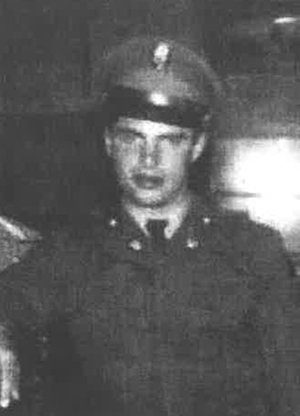

Remember...
Eugene White
1932-1950
"As a Korean War veteran, I know firsthand and understand the sacrifices made by our men and women in uniform."
Charles B. Rangel
Eugene White was born in Summersville, Nicholas County, West Virginia, to Richard and Elvira Deal White on August 15, 1932. In 1930, the Federal Census taker recorded that the family was living in Summersville and that Richard White was a laborer at a sawmill. In 1940, the census record indicates that the family still lived in Summersville but no occupation was recorded for any member of the household. By the time the census was taken, Richard, known as Dick, and Elvira were joined by Daisy, Irene, Jesse James, Alfreda, and Albert. In the next decade, they were joined by Geraldine, Alfreda, Mary Louise, Eloise, Susan, Ruby Lee, Edmond, Richard Jr., and a foster child named Gary.
In 1949, the Beckley Post-Herald announced that local young men had enlisted in the military. Among them was Eugene White, who enlisted on November 17, 1949. He took his basic training at Fort Knox, Kentucky. He went home to his family during a furlough in December 1949 and left for overseas duty in March 1950. He was placed with the Company B, 21st Infantry, 24th Infantry Division.
The 24th was part of an occupying force in Japan after World War II and had begun downsizing by 1950 when the Korean War began on June 25, 1950. The 24th was among the first into Korea when the U.S. joined the conflict, understaffed and underequipped. ("A Summary of the 24th Infantry Division: Victory Division," Military Vet Shop.com, updated 22 September 2010, accessed 18 March 2020, http://www.militaryvetshop.com/History/24thInfantryDivision.html.)
As described in the above overview of the division's history, the goal of early fighting for the U.S. forces was to delay and hinder the North Korean forces until the United Nation forces could be deployed and the U.S. forces built. The delaying tactics worked, but at great cost. By July 16, 1950, the 24th was attempting to protect individual cities and strong positions but was overwhelmed by North Korea's numbers and tanks. However, they were eventually successful in delaying the advance of North Korean troops, and the delay gave South Korea enough time to settle its defenses around Pusan. United Nation forces tightened the defense from the Pusan Perimeter to the Naktong River by the end of July.
July 5, 1950, was the first day of the first engagement of the war that was to come. This occurred at Osan and ended more than two weeks later with the fall of Taejon. In that course of time, the 24th Infantry Division was nearly destroyed. According to multiple references, the Battle of Osan resulted in a defeat for U.S. forces, which were overwhelmed by the larger, well-equipped North Korea forces. By this time, the 24th had joined with the 21st Infantry Division, at the command of Lieutenant Colonel Charles Bradford Smith, and so the defense was called "Task Force Smith." Task Force Smith was able to hold its ground for three hours but was then flanked and forced to retreat. The maneuver did not go well and resulted in the loss of 40 percent of troops. Sixty were killed in action and 82 were captured. Private Eugene White lost his life on this first day of fighting. (Ben Loudermilk, "The Battle of Osan--Korean War," World Atlas, 25 April 2017, accessed 10 July 2020, https://www.worldatlas.com/articles/the-battle-of-osan-korean-war.html.)
Further information on the role of Task Force Smith and the operation in which Pvt. Eugene White lost his life can be found in the monograph Task Force Smith and the 24th Infantry Division in Korea, July 1950. (MAJ Raymond M. Longabaugh, [Fort Leavenworth, KS: 2014], accessed 10 July 2020, https://apps.dtic.mil/dtic/tr/fulltext/u2/a612249.pdf.)
On the Korean War Memorial site, Eugene White's brother, Albert, who passed away in 2002, wrote that he remembered fishing and swimming with his brother in Muddlety Creek and in the Gauley River.
Article prepared by Cynthia Mullens
November 2020

West Virginia Archives and History welcomes any additional information that can be provided about these veterans, including photographs, family names, letters and other relevant personal history.